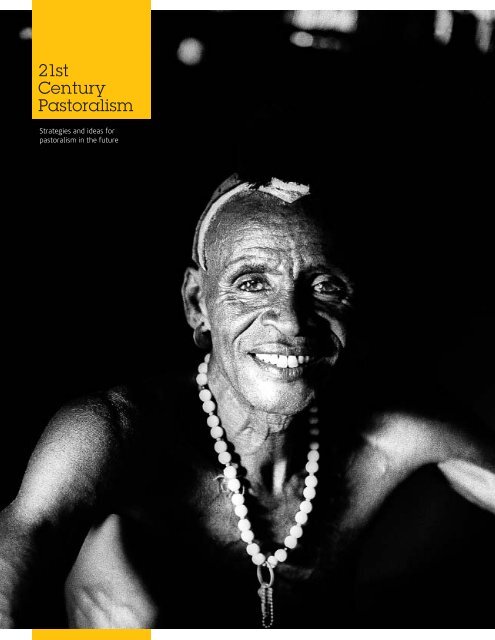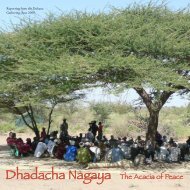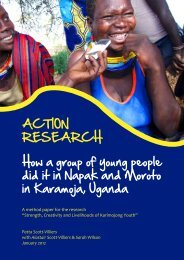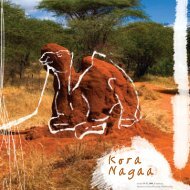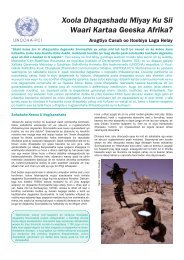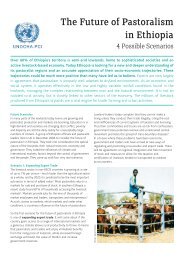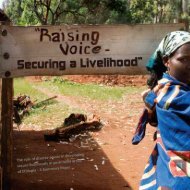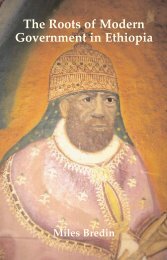Download PDF (2.3Mb) - the Website of the Pastoralist ...
Download PDF (2.3Mb) - the Website of the Pastoralist ...
Download PDF (2.3Mb) - the Website of the Pastoralist ...
You also want an ePaper? Increase the reach of your titles
YUMPU automatically turns print PDFs into web optimized ePapers that Google loves.
21st<br />
Century<br />
Pastoralism<br />
Strategies and ideas for<br />
pastoralism in <strong>the</strong> future
21st Century Pastoralism<br />
Editor: Andrew Heavens<br />
Designed by: Giant Arc Design<br />
Printed by: One Digital<br />
Published by <strong>the</strong><br />
UN OCHA <strong>Pastoralist</strong> Communication Initiative<br />
P O Box 27068, Addis Ababa, 1000, Ethiopia<br />
Telephone: +251 (0) 115 444420<br />
info@unocha-pci.org<br />
www.pastoralists.org<br />
Any parts <strong>of</strong> this publication may be copied or<br />
reproduced, provided that <strong>the</strong> parts reproduced are<br />
distributed free or at cost, not for pr<strong>of</strong>it. For any<br />
reproduction with commercial ends, permission<br />
must first be obtained from <strong>the</strong> publisher. The<br />
publisher would appreciate being sent a copy <strong>of</strong> any<br />
materials in which text or images have been used.<br />
© The UN OCHA <strong>Pastoralist</strong> Communication<br />
Initiative 2008<br />
For fur<strong>the</strong>r information or additional copies <strong>of</strong> this<br />
publication, please contact UN OCHA-PCI at <strong>the</strong><br />
above address.<br />
The opinions expressed in this publication do not<br />
necessarily reflect though <strong>of</strong> <strong>the</strong> United Nations nor<br />
<strong>the</strong> UK Department for International Development.<br />
Photo credits<br />
Photos on front cover, pages 9, 15, back cover:<br />
© Marie Hernandez<br />
Photo on page 3:<br />
© Hamish Wilson / Panos Pictures<br />
Photos on page 5:<br />
(top) © Stuart Freedman / Panos Pictures<br />
(bottom) © UN OCHA-PCI / Antonio Fiorente<br />
Photo on pages 6, 19 and 21:<br />
© UN OCHA-PCI / Antonio Fiorente<br />
Photos on page 8:<br />
(top) © Crispin Hughes / Panos Pictures<br />
(bottom left) © Sarah Wilson<br />
(bottom right) © Giacomo Pirozzi / Panos Pictures<br />
Photo on page 11:<br />
© Mark Henley / Panos Pictures<br />
Photo on page 12:<br />
© Sven Torfinn / Panos Pictures<br />
Photo on page 14:<br />
(top) © Petterik Wiggers / Panos Pictures<br />
(bottom) © Crispin Hughes / Panos Pictures<br />
Photo on page 17:<br />
© Andrew Heavens<br />
Photos on page 18:<br />
(top) © Dieter Telemans / Panos Pictures<br />
(bottom) © Giacomo Pirozzi / Panos Pictures
Preface<br />
This report is about 21st century<br />
pastoralism, a way <strong>of</strong> life for millions <strong>of</strong><br />
people across <strong>the</strong> world today. It is a<br />
livelihood with a viable, vibrant present<br />
and – as this report will show – a viable,<br />
vibrant future.<br />
Below you will find a series <strong>of</strong> strategies<br />
and ideas for taking pastoralism fur<strong>the</strong>r<br />
into <strong>the</strong> 21st century. The ideas were<br />
born out <strong>of</strong> a meeting <strong>of</strong> 17 pastoralist<br />
thinkers from India, Ethiopia, Kenya, Mali,<br />
Mauritania, Nigeria, Niger, Cameroon and<br />
<strong>the</strong> UK who came toge<strong>the</strong>r in Amboseli<br />
Park, Kenya, in March 2007.<br />
The conversation was designed to spark<br />
fur<strong>the</strong>r debate among pastoralists,<br />
politicians, business people and all o<strong>the</strong>r<br />
interested parties. The issues it raised<br />
are also central to today's worldwide<br />
debates about <strong>the</strong> environment and <strong>the</strong><br />
economics and politics <strong>of</strong> globalisation.<br />
‘Going back to Jesus and Abraham, all<br />
<strong>the</strong> way to Ali Wario today, pastoralism<br />
is still with us. We are still <strong>the</strong>re and will<br />
be <strong>the</strong>re. We don't need to worry about<br />
<strong>the</strong> viability <strong>of</strong> pastoralism in <strong>the</strong> world<br />
today... [But] it is unfortunate we don't<br />
have a proper policy supporting this<br />
wonderful land... The major issues,<br />
land ownership, education, environment,<br />
marketing, <strong>the</strong>se are <strong>the</strong> areas I want to<br />
focus on. Eighty per cent <strong>of</strong> <strong>the</strong> land is<br />
under pastoralism. Ninety per cent <strong>of</strong><br />
<strong>the</strong> wildlife is found in pastoral areas.<br />
But [pastoralism] is not recognised in<br />
this country as a land use system.’<br />
Ali Wario, Kenya<br />
‘My vision is becoming concrete. I had<br />
a dream years ago to see pastoralists<br />
meeting and sharing. I think we have<br />
that and it is a beginning. Where <strong>the</strong>re<br />
is a meeting <strong>the</strong>re is hope.’<br />
Mohamed Ewangaye, Niger<br />
<strong>Pastoralist</strong> thinkers:<br />
Cameroon Hajara Haman<br />
Ethiopia Nura Dida<br />
India Dewa Ram Dewasi / Hanwant Singh<br />
Kenya Abdi Umar / Ali Wario /<br />
Daoud Tari Abkula / Jarso Mokku /<br />
Peter Emuria / Said Ali Elmi<br />
Mali Adam Thiam / Mohamed Ali Ag Hamana<br />
Mauritania Dah Ould Khtour<br />
Niger Mohamed Ewangaye /<br />
Ourtoudo Bermo<br />
Nigeria Nafisatu Mohamed<br />
UK Jeremy Swift<br />
02
03<br />
Pastoralism<br />
and political<br />
power
If <strong>the</strong>y are to have a future as productive,<br />
knowledgeable and contented societies,<br />
pastoralist communities need to find ways to<br />
exert more political influence.<br />
Good government will help pastoralists to<br />
thrive – although <strong>the</strong>ir resilient systems <strong>of</strong> selfmanagement<br />
will <strong>of</strong>ten survive bad government.<br />
They want better representation, self-government<br />
at local level and a bigger role for traditional<br />
institutions. More than anything <strong>the</strong>y are<br />
calling for land rights, to secure <strong>the</strong>ir lives<br />
and livelihoods.<br />
‘As you go around <strong>the</strong> issues such as education and health, it all boils down to how well <strong>the</strong> society<br />
is governed. That is mainly <strong>the</strong> big issue. If you talk about education, whe<strong>the</strong>r it is accessible or<br />
not depends on how responsive <strong>the</strong> government is to <strong>the</strong> condition <strong>of</strong> pastoralists.’<br />
Nafisatu Mohamed, Nigeria<br />
‘I want to emphasise politics every time. I want to focus on <strong>the</strong> role <strong>of</strong> pastoralists in <strong>the</strong> political<br />
process, in defining policies about education, health, <strong>the</strong> economy and everything. If pastoralists<br />
are not present in <strong>the</strong> policy-making process, how can <strong>the</strong>y define <strong>the</strong>ir own identity and future?’<br />
Mohamed Ewangaye, Niger<br />
(Top) Parliamentary debate - Hargeisa, Somaliland<br />
(Bottom) Traditional leaders address pastoralists - Qarsa Dambi, Ethiopia<br />
04
‘I am a pastoralist and<br />
everything about me and<br />
my family is pastoralist.<br />
We have been working<br />
on building our own<br />
representation within <strong>the</strong><br />
government. We want<br />
<strong>the</strong> process <strong>of</strong> o<strong>the</strong>r<br />
people speaking for<br />
pastoralists to come to<br />
an end. The challenge<br />
is that people think <strong>the</strong>y<br />
know and understand<br />
us, but <strong>the</strong>y don't.’<br />
Nura Dida, Ethiopia<br />
06<br />
Elders at a pastoralist ga<strong>the</strong>ring - Qarsa Dambi, Ethiopia
The challenge<br />
The pastoralist lifestyle is coming<br />
under increasing pressure from<br />
external political forces. Traditional<br />
land management systems, which<br />
once sustained <strong>the</strong> environment<br />
and minimised conflict, have been<br />
abolished in many countries.<br />
Competition for land with farmers and<br />
o<strong>the</strong>r industries is rising. Meanwhile,<br />
new political arrangements have given<br />
power to individuals and groups that<br />
<strong>of</strong>ten do not represent pastoralists.<br />
‘A system has appeared in Mali,<br />
formalized in <strong>the</strong> new land tenure<br />
system. The new code <strong>of</strong> Mali does not<br />
recognise any land rights to <strong>the</strong> rural<br />
producers, especially <strong>the</strong> herders. They<br />
say agriculturalists can own, but pastures<br />
cannot be owned, even by a community.<br />
That wasn't <strong>the</strong> case before. The land<br />
used to be owned by <strong>the</strong> community.<br />
The new economics are destroying <strong>the</strong> old<br />
system without creating a new system.’<br />
Adam Thiam, Mali.<br />
The vision<br />
Current political progress<br />
In an ideal future, pastoralists will<br />
have a strong voice in national and<br />
international affairs, something <strong>the</strong>y never<br />
had in <strong>the</strong> past. There are three ways <strong>of</strong><br />
streng<strong>the</strong>ning <strong>the</strong>ir political influence:<br />
increasing political representation <strong>of</strong><br />
minorities within existing institutions;<br />
decentralising government power,<br />
allowing a measure <strong>of</strong> self-government;<br />
and building up customary institutions,<br />
trusted by <strong>the</strong> people.<br />
‘Africa itself is democratising. The fact<br />
we have a pastoral MP is a sign that<br />
things are changing,’ said Adam Thiam,<br />
from Mali. ‘You have new mayors in<br />
<strong>the</strong> pastoral communities. The AU is<br />
for <strong>the</strong> first time launching a continental<br />
brainstorming...There are problems but,<br />
if <strong>the</strong> current tendency continues, we<br />
will have a much better environment<br />
for people to put pressure on <strong>the</strong><br />
government - despite <strong>the</strong> reluctance<br />
to see pastoralism as a culture and<br />
economy on its own.’<br />
The road toward good governance is<br />
a more effective integration between<br />
formal and customary governments.<br />
Yet customary governments should not be<br />
given a blank cheque; <strong>the</strong>y too have <strong>the</strong>ir<br />
limitations. More and more pastoralists are<br />
now winning seats in national assemblies<br />
– thanks partly to a number <strong>of</strong> affirmative<br />
action programmes and quota systems.<br />
This local representation will only increase<br />
as local communities are given more<br />
power to pick <strong>the</strong>ir own candidates –<br />
ra<strong>the</strong>r than accepting a candidate<br />
imposed upon <strong>the</strong>m by a party list.<br />
The effectiveness <strong>of</strong> that representation<br />
should also improve with <strong>the</strong> introduction<br />
<strong>of</strong> more civic education programmes.<br />
The formation <strong>of</strong> pastoral standing<br />
committees in legislative bodies has<br />
helped amplify <strong>the</strong> voices <strong>of</strong> pastoralists.<br />
These committees are most effective<br />
when <strong>the</strong>y have statutory powers and<br />
when <strong>the</strong>y include a mix <strong>of</strong> pastoralist<br />
and non-pastoralist representatives.<br />
But, <strong>of</strong> course, representation is not<br />
<strong>the</strong> answer if it is only empty talk<br />
and cronyism. One downside <strong>of</strong><br />
decentralisation can be <strong>the</strong> creation<br />
<strong>of</strong> ano<strong>the</strong>r level <strong>of</strong> local elites that<br />
can focus on <strong>the</strong>ir own interests and,<br />
potentially, oppress minority groups<br />
within <strong>the</strong>ir own communities.<br />
‘Higher representation doesn't mean<br />
you are taking on <strong>the</strong> issues. You can<br />
have guys from <strong>the</strong> village <strong>the</strong>re, but<br />
without seeing <strong>the</strong> big picture. You can<br />
have <strong>the</strong> representation, without <strong>the</strong><br />
media encouraging a national debate,’<br />
said Peter Emuria from Kenya. ‘Higher<br />
representation <strong>of</strong>ten means more noise,<br />
but that noise has to be relevant.’<br />
‘The decentralisation process has<br />
allowed pastoralists to be represented<br />
at <strong>the</strong> local decision making levels,’ said<br />
Mohamed Ali Ag Hamana from Mali.<br />
‘The current situation is that although<br />
pastoralists have been elected as mayor,<br />
<strong>the</strong> transfer <strong>of</strong> resources from <strong>the</strong> central<br />
state to <strong>the</strong> local level has not happened.’<br />
Land needs to be protected<br />
It is crucial to have pastoralists' rights to<br />
<strong>the</strong>ir land codified in law. This will give<br />
<strong>the</strong>m some level <strong>of</strong> protection as markets<br />
open and outsiders move in to compete<br />
in <strong>the</strong> livestock trade and in using<br />
valuable land and water resources.<br />
Governments need to create appropriate<br />
authorities to protect that land right<br />
whenever it is challenged.<br />
‘[In some West African countries] <strong>the</strong>re<br />
has been a transferring <strong>of</strong> power to<br />
pastoralists,’ said Dah Ould Khtour from<br />
Mauritania. ‘The state cannot now claim<br />
<strong>the</strong> pastoral land because pastoralists<br />
have <strong>the</strong> power to control <strong>the</strong>ir land.<br />
You cannot even carry out construction<br />
near a bore hole. And <strong>the</strong> population<br />
<strong>the</strong>mselves cannot sell <strong>the</strong> land. They<br />
only have <strong>the</strong> right to manage.’<br />
Everyone can benefit<br />
A strong relationship between<br />
pastoralists and <strong>the</strong> central political<br />
power can be good for <strong>the</strong> national<br />
economy. Instead <strong>of</strong> resisting and<br />
distancing <strong>the</strong>mselves from governments<br />
<strong>the</strong>y consider useless or even dangerous,<br />
pastoralists will be able to cooperate,<br />
manage land effectively, innovate<br />
and diversify and, importantly for<br />
government, pay <strong>the</strong>ir taxes and cast<br />
<strong>the</strong>ir votes.<br />
But it is a different picture when that<br />
relationship breaks down. Experience<br />
shows that various levels <strong>of</strong> resistance<br />
develop. This can range from open<br />
dissent and non-cooperation, to civil<br />
disobedience, even violent conflict.<br />
People can refuse to help <strong>of</strong>ficials,<br />
refuse <strong>the</strong>m water, exaggerate prices,<br />
evade taxes, refuse to take part in<br />
censuses and revert entirely to<br />
customary institutions. In <strong>the</strong> worst<br />
cases, pastoralists may join armed<br />
militia groups and move into banditry<br />
and kidnapping.<br />
‘Resistance comes when <strong>the</strong>re are no<br />
pastoralist-friendly policies for education<br />
and markets. When everything around<br />
you is a difficulty, it is easy to develop<br />
a negative attitude. <strong>Pastoralist</strong>s decide<br />
to come up with <strong>the</strong>ir own party here.<br />
They even form a militia group.’<br />
Ali Wario, Kenya<br />
‘One <strong>of</strong> <strong>the</strong> systems <strong>of</strong> resistance is<br />
distancing yourself from your own<br />
government and relying more on your<br />
own systems. You stop relying on it. If<br />
you can't change <strong>the</strong> government, you<br />
smile when <strong>the</strong>y are around and curse<br />
<strong>the</strong>m when <strong>the</strong>y leave. If <strong>the</strong>y inquire<br />
about something, you point <strong>the</strong>m in <strong>the</strong><br />
opposite direction <strong>of</strong> where it is. If <strong>the</strong>y<br />
want to buy something that costs two<br />
shillings, you tell <strong>the</strong>m it's ten.’<br />
Ourtoudo Bermo, Niger<br />
07
Traders in Karamoja, Uganda<br />
District administrator's <strong>of</strong>fice - Dimeka, Ethiopia<br />
Prison regulations - N'Djamena, Chad<br />
08
09<br />
Pastoralism<br />
and <strong>the</strong><br />
economy
As markets open up pastoralists will be quick<br />
to grasp <strong>the</strong> advantages, despite <strong>the</strong> many risks.<br />
Many recognize that <strong>the</strong>y need to be inventive,<br />
adapting and diversifying <strong>the</strong>ir businesses<br />
to meet growing economic challenges, and<br />
<strong>the</strong>y speak <strong>of</strong> how much <strong>the</strong>y need knowledge<br />
and freedom to act.<br />
They want <strong>the</strong> tools to innovate and streng<strong>the</strong>n<br />
<strong>the</strong>ir livelihoods, and to find alternatives. This<br />
means preserving cross-border movement and<br />
regional market access. They want additional<br />
training and education to diversify into new<br />
areas. They call for wider availability <strong>of</strong> credit<br />
and financial services.<br />
10
The challenge<br />
Protective tariffs and regulations are<br />
blocking access to key international<br />
markets. Subsidies to meat producers in<br />
wealthy countries including Argentina,<br />
<strong>the</strong> US and France sometimes flood African<br />
markets with low-price meat, undercutting<br />
local suppliers. Importing countries<br />
routinely impose long bans on African meat<br />
and livestock following reports <strong>of</strong> animal<br />
diseases. As time goes on and old systems<br />
<strong>of</strong> wealth sharing decline, <strong>the</strong> gap between<br />
rich and poor pastoralists is widening.<br />
The vision<br />
Opportunities<br />
‘I like <strong>the</strong> world open,’ said Abdi Noor<br />
Umar, from Kenya. ‘A lot <strong>of</strong> restrictions in<br />
demand areas will fall away along with <strong>the</strong><br />
subsidy to rich Australian, Argentine and<br />
US producers. So <strong>the</strong>re will be big demand.<br />
The variability will be an opportunity.’<br />
Dah Ould Khtour from Mauritania<br />
added: ‘There will be a reclassification<br />
<strong>of</strong> pastoralists, rich and poor, and a<br />
specialisation <strong>of</strong> pastoral production.<br />
Some will remain as pastoralists in <strong>the</strong><br />
traditional manner while o<strong>the</strong>rs will<br />
develop <strong>the</strong>ir system. That is what will<br />
allow for satisfaction <strong>of</strong> <strong>the</strong> local market<br />
but also provision to an external market.’<br />
Diversification<br />
<strong>Pastoralist</strong>s could do more to diversify<br />
<strong>the</strong>ir economies beyond <strong>the</strong> production<br />
<strong>of</strong> meat and livestock. Tourism is just<br />
one largely untapped area that could be<br />
explored. But, <strong>of</strong> course, diversification <strong>of</strong><br />
livelihoods in rural areas can be <strong>the</strong> cause<br />
<strong>of</strong> conflict as <strong>the</strong> remaining pastoralists<br />
clash with <strong>the</strong> new agro-pastoralists or<br />
tourism entrepreneurs. This is where<br />
pastoralists can benefit from a good<br />
relationship with government – good<br />
governance being crucial to <strong>the</strong><br />
management <strong>of</strong> <strong>the</strong>se disputes.<br />
Increased global demand for organic<br />
meat could bolster pastoral production.<br />
Niche markets for products like camel<br />
meat and milk could also expand. It is<br />
not just international trade regulations<br />
that need to change, pastoralists also<br />
need more and better credit and financial<br />
services, from private, public or even<br />
local sources to help <strong>the</strong>m develop <strong>the</strong>ir<br />
existing businesses and move into o<strong>the</strong>rs.<br />
Education<br />
A powerful way <strong>of</strong> coming up with<br />
new strategies is to educate young<br />
pastoralists and encourage <strong>the</strong>m to<br />
innovate. But prevailing prejudice against<br />
pastoralist communities has always<br />
undermined education initiatives in<br />
nomadic areas – <strong>the</strong> clichéd view is that<br />
once you are educated you have moved<br />
on from being a pastoralist. But schools<br />
and curricula can streng<strong>the</strong>n respect for<br />
pastoralism and ability to innovate. It is<br />
all a question <strong>of</strong> attitude. Nigeria has had<br />
some success by getting schools to train<br />
young pastoralists, for example. Nigerian<br />
pastoralists' fears that <strong>the</strong>ir educated<br />
young people would automatically<br />
migrate to cities did not materialize<br />
and <strong>the</strong> scheme has become popular.<br />
‘Unfortunately, in most places, <strong>the</strong><br />
education system is not meant for<br />
pastoralists so you have to choose<br />
between education and your way <strong>of</strong> life,<br />
which is why we have so few pastoralist<br />
pr<strong>of</strong>essors,’ said Ali Wario, a Kenyan<br />
MP and pastoralist.<br />
Urbanisation<br />
Africa's growing urbanisation could<br />
challenge or complement <strong>the</strong> traditional<br />
pastoralist lifestyle. There is already a<br />
considerable upside for <strong>the</strong> pastoralist<br />
economy – <strong>the</strong> rising demand for meat<br />
and o<strong>the</strong>r livestock products and new<br />
opportunities for people from pastoralist<br />
families to take up new businesses.<br />
‘In twenty years it is a possibility that <strong>the</strong>re<br />
will be pastoral towns, but not necessarily<br />
settlement. People will have an urban life<br />
but <strong>the</strong> system <strong>of</strong> movement will still<br />
remain,’ said Nura Dida, from Ethiopia's<br />
Borana community. ‘There's a possibility <strong>of</strong><br />
split in families. For example, in one family<br />
with three wives, one remains in town<br />
while two move with animals, and milking<br />
animals will be around [settled] areas, so<br />
rules will have to develop. We're already<br />
thinking about that, about how to regulate<br />
land around urban centres...There is a<br />
proverb in our language. Life is in mobility.<br />
I want people to understand one thing.<br />
If <strong>the</strong> animals don't move, that's <strong>the</strong> end<br />
<strong>of</strong> <strong>the</strong> animals.’<br />
Livestock market - Douz, Tunisia<br />
11
The port at Mogadishu - Somalia<br />
12
13<br />
‘It is a question <strong>of</strong> how<br />
to keep pace with <strong>the</strong><br />
changing world and to<br />
have institutions that<br />
can make strategic<br />
engagements with<br />
political and economic<br />
processes. <strong>Pastoralist</strong>s<br />
are resilient and can<br />
adapt to changes, but<br />
for pastoralists to survive<br />
in <strong>the</strong> future and exploit<br />
an ever-changing outside<br />
environment, <strong>the</strong>y have<br />
to be inventive.’<br />
Daoud Abkula, Kenya
Business man in Bossaso, Somalia<br />
Cattle market - Bamako, Mali<br />
14
15<br />
Pastoralism<br />
and <strong>the</strong><br />
environment
<strong>Pastoralist</strong>s have a lot to teach <strong>the</strong> rest <strong>of</strong> <strong>the</strong><br />
world when it comes to adapting to harsh<br />
climactic conditions. But more erratic wea<strong>the</strong>r<br />
patterns could make <strong>the</strong> pastoralist lifestyle<br />
increasingly challenging in <strong>the</strong> future.<br />
And pastoralists are already having to cope<br />
with increasing competition for land with<br />
farms, o<strong>the</strong>r business interests and Africa's<br />
ever-growing urbanisation.<br />
‘Our animals are beneficial to <strong>the</strong> environment. They are eco-friendly. Animals and <strong>the</strong> environment<br />
depend on one ano<strong>the</strong>r.’<br />
Dewa Ram Dewasi, Rajasthan, India<br />
16
The challenge<br />
Rainfall is due to become even more<br />
erratic over <strong>the</strong> Sahel and eastern Africa,<br />
as climate change streng<strong>the</strong>ns its hold on<br />
<strong>the</strong> continent. Current analysis suggests<br />
global warming may actually increase<br />
rain levels in some pastoralist areas.<br />
But those rains will become more<br />
unpredictable and <strong>the</strong> gaps between<br />
<strong>the</strong>m may increase. Harsh wea<strong>the</strong>r<br />
conditions will add to <strong>the</strong> pressures<br />
caused by <strong>the</strong> encroachment <strong>of</strong> fenced<br />
farmland and <strong>the</strong> erosion <strong>of</strong> traditional<br />
land sharing agreements.<br />
The vision<br />
Existing expertise<br />
<strong>Pastoralist</strong>s are experts at making <strong>the</strong><br />
most <strong>of</strong> unpredictable climactic and<br />
environmental conditions. They use<br />
mobility, careful management <strong>of</strong> key<br />
resources and selective breeding. They<br />
also know how and when to make <strong>the</strong><br />
most <strong>of</strong> <strong>the</strong>ir markets to eke out scarce<br />
resources and help families in need.<br />
‘Often what we regard as science<br />
can display itself to be false science,’<br />
said Said Ali Elmi from Somalia. ‘So<br />
pastoralists shouldn't lose confidence<br />
in <strong>the</strong>ir knowledge.’<br />
The importance <strong>of</strong> good governance<br />
Even <strong>the</strong> worst climatic conditions can<br />
be allayed by a responsive government<br />
with a good relationship with its<br />
pastoralist communities. Increasingly<br />
variable rainfall may actually benefit<br />
some pastoralists, those who maintain<br />
<strong>the</strong>ir ability to be mobile. Once again,<br />
good governance is key.<br />
‘When you start with good governance,<br />
even when <strong>the</strong> climate is poor, <strong>the</strong>re<br />
is a contingency in place so that <strong>the</strong><br />
impact is managed well,’ said Borana<br />
elder Nura Dida. ‘By <strong>the</strong> time you find<br />
yourself in that position, you already<br />
know what to do.’<br />
‘If we get good governance and<br />
good climate conditions, all pastoralists<br />
will have more knowledge, <strong>the</strong> young<br />
generation will be more educated<br />
and that will help reduce <strong>the</strong> poverty<br />
within <strong>the</strong> communities.’<br />
Dah Ould Khtour, Mauritania<br />
Minimising <strong>the</strong> impact<br />
‘Even though <strong>the</strong> climate is poor,<br />
<strong>the</strong>re is a way <strong>of</strong> bringing out lots <strong>of</strong><br />
innovation to ensure <strong>the</strong> quality <strong>of</strong> <strong>the</strong><br />
animals. You may have ways <strong>of</strong> taking<br />
care <strong>of</strong> those animals’ said Ourtoudo<br />
Bermo, from Niger.<br />
Governments and traditional pastoral<br />
authorities could work toge<strong>the</strong>r to<br />
minimise <strong>the</strong> impact <strong>of</strong> droughts<br />
and o<strong>the</strong>r environmental shocks.<br />
Agreements could be reached to<br />
allow pastoralists to cross borders<br />
freely to pasture and water. Customary<br />
governments are already experienced<br />
in negotiating <strong>the</strong>se arrangements.<br />
Social insurance programmes could<br />
be developed out <strong>of</strong> those that already<br />
exist within pastoralist societies to<br />
s<strong>of</strong>ten <strong>the</strong> blow <strong>of</strong> sudden disasters.<br />
During times <strong>of</strong> drought, when<br />
pastoralists sell <strong>of</strong>f <strong>the</strong>ir animals, <strong>the</strong>re<br />
are <strong>of</strong>ten no banks to take <strong>the</strong> money,<br />
or to channel <strong>the</strong> cash back to <strong>the</strong><br />
community as investment. <strong>Pastoralist</strong>s<br />
are calling for more financial institutions<br />
to open up in pastoral areas. These<br />
institutions will need to find more<br />
pastoralist-friendly ways <strong>of</strong> delivering<br />
<strong>the</strong>ir services, for example accepting<br />
collective guarantees as collateral.<br />
<strong>Pastoralist</strong>s could do a lot more to<br />
boost internal trade within <strong>the</strong>ir own<br />
countries, leaving <strong>the</strong>m less reliant on<br />
international trade. An integration <strong>of</strong><br />
markets, which comes about when <strong>the</strong><br />
markets are able to operate more freely,<br />
could also balance out production<br />
in a given year, as excess production<br />
in one area compensates for lower<br />
production in ano<strong>the</strong>r. In most countries,<br />
however, this would depend on<br />
huge improvements to <strong>the</strong> existing<br />
transportation and communication<br />
networks and changes in regulations<br />
and taxation regimes. <strong>Pastoralist</strong>s would<br />
also have to prepare <strong>the</strong>mselves for<br />
greater competition in <strong>the</strong>ir markets –<br />
and for <strong>the</strong> possibility <strong>of</strong> ‘outsiders’<br />
taking advantage <strong>of</strong> <strong>the</strong> more open<br />
market conditions to enter <strong>the</strong><br />
livestock business.<br />
17
Herding sheep by <strong>the</strong> Nile - Luxor, Egypt<br />
Herder and his son - Maradi, Niger<br />
18
‘<strong>Pastoralist</strong>s have been<br />
able to adapt to nature,<br />
to climate change, for<br />
thousands <strong>of</strong> years. Their<br />
weakness is adapting to<br />
human change.’<br />
Mohamed Ewangaye,<br />
Niger<br />
Sources <strong>of</strong> energy - Qarsa Dambi, Ethiopia<br />
19
End note<br />
‘I'm starting with a vision where I see a government receptive to<br />
and accommodating <strong>of</strong> pastoralist interests and concerns. [I see]<br />
pastoralists who have a right to <strong>the</strong>ir land and are in charge <strong>of</strong><br />
land resources and with access to all <strong>the</strong> external resources on<br />
which <strong>the</strong>y depend. Combine those two forces and you get better<br />
livelihoods and access to amenities such as health and education<br />
and <strong>the</strong> enjoyment <strong>of</strong> a good life. And finally, I see pastoralism<br />
contributing to <strong>the</strong> human race through <strong>the</strong> sustainable use <strong>of</strong><br />
natural resources.’<br />
Nura Dida, Ethiopia<br />
20
Cattle herder - Yabello Ethiopia
21st<br />
Century<br />
Pastoralism<br />
This report is about 21st<br />
century pastoralism, a way<br />
<strong>of</strong> life for millions <strong>of</strong> people<br />
across <strong>the</strong> world today. It is<br />
a livelihood with a viable,<br />
vibrant present and – as this<br />
report will show – a viable,<br />
vibrant future.


